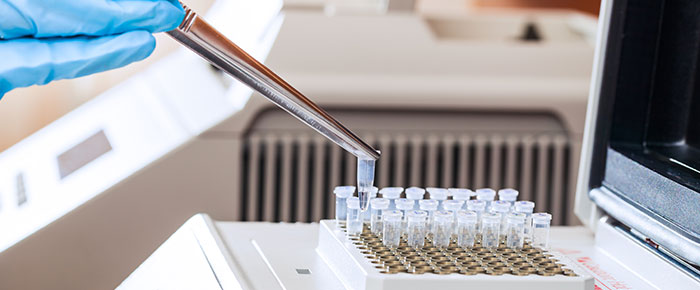
With the omicron variant spreading worldwide like wildfire, supply chains are at severe risk of a slowdown, as workers have become increasingly affected by COVID-19. Supply shortages and shortfalls aren’t just an issue for common commercial interests; they also pose a stiff test to scientific progress and pharmaceutical production, both of which are crucial right now as researchers search for novel COVID-19 treatments and aim to supply as many vaccines as possible. Luckily, there are still some ways that scientists and manufacturers can help mitigate these slowdowns, both in the short-term and long-term.
Reagent shortages
Diagnostic testing is at a premium right now, with more COVID-19 tests needed than are available. The US is currently running somewhere near 3 million tests per week, which is a considerably small number bearing in mind the US population is over 300 million people, and omicron is spreading at an exponential pace across the country. Unfortunately, as more testing kits are needed each day, so are their components, like PCR enzymes and primers. Shortages for these types of reagents affect everyone, from diagnostic testing manufacturers to industrial and academic laboratories.
One method of accounting for these shortages is by finding novel reagents that may replace those currently used in testing kits. Beckman Coulter did such a thing when it found a replacement for proteinase K, an enzyme used to digest proteins surrounding the nucleotides during RNA extraction. They used SPRI paramagnetic bead-based technology to capture RNA using magnetic particles; once the particles are captured, the rest is washed out, including proteins, mitigating the need for proteinase K altogether. Importantly, this method can be scaled up and has been included as part of FDA’s guidance on extraction methods that can be used for COVID-19 PCR testing.
Another group at the Sabin Medicina Diagnóstica in Brazil, who previously developed an RT-qPCR test for COVID-19, discovered that lowering the concentration of primers 5-fold and the concentration of the probe 2.5-fold could yield the same results as using standard stocks of these reagents. They obtained nearly identical results using clinical samples, and in doing so, potentially increased testing capabilities by almost 30%.1
Lab consumables
Pipette tips, coveted by scientists and medical technologists as likely their most-used lab consumables, are now at risk of shortages across the globe. The reasons for this shortage are three-pronged: Texas power grid blackouts, supply chain dysfunction due to COVID-19, and increased demand for testing kits. The shortage has been felt especially hard by testing centers who screen infants for genetic disorders. Physicians rely on these results to decide whether the baby needs specialized treatment; without it, infants can be at high risk for increased morbidity or mortality. The shortage is so severe that these labs have even pressured the US Federal Government into prioritizing pipette tips to serve screening programs.
While high demand and supply chain issues are likely to remain for as long as COVID-19 is around, one solution is for those dependent on tips to invest in systems designed to wash them thoroughly. Companies that specialize in these products, like Grenova, also make washing systems for other lab consumables, like microplates. For large labs that depend on a high volume of consumables, these systems can reduce the demand for newly manufactured items. However, they may not represent an effective strategy for smaller labs, as tips need to be re-inserted into their boxes prior to cleaning, which can be a time-consuming, labor-dependent task.
Lab animals
Animals are another area where scientists are feeling the effects of COVID-19 slowdowns. Rhesus monkeys, in particular, are hard to find, making life difficult for the pre-clinical testing departments of many pharmaceutical companies. In addition, some breeding companies, like Nasco Education, have been forced to stop selling Xenopus frogs since demand has been at an all-time low recently. Other animals are in short supply due to increased demand for vaccine testing and a ban on shipping wildlife from China.
Mitigating slowdowns caused by animals shortages requires more long-term solutions. Acquiring the capabilities to maintain and breed lineages is expensive and requires a lot of inaccessible resources; however, collaboration between and investment from academic labs from different departments and institutions may help speed up animal experimentation, even if it takes a few years to develop these types of facilities.
Another factor that needs to be considered is the potential shortage of veterinarians and other staff required to care for animals. Interestingly, solutions to pandemic-related deficits in lab animal care had already been published in 2010 by a group at The Rockefeller University. They provided a complete guideline on how to prepare for a pandemic, including plans for social distancing, N95 mask and sanitizer usage, lines of communication, shutting down nonessential research operations (termed “hibernation”), personnel training and logistics, supply conservation, population management, euthanasia, and mitigating research losses, which includes cryopreservation of valuable animal strains.
No one knows when things will go back to normal, if ever. It’s clear that, three years into the COVID-19 pandemic, academic and pharmaceutical labs need long-term solutions to address supply chain dysfunction and the shortages they cause. Were the pandemic to end tomorrow, investing for the future would remain imperative; with climate change on the horizon, COVID-19 is likely not the last event that will severely affect the supply chain. For now, scientists must adapt to this new environment by devising innovative, more sustainable methods of managing their stocks of reagents, consumables, and animals.
LabTAG by GA International is a leading manufacturer of high-performance specialty labels and a supplier of identification solutions used in research and medical labs as well as healthcare institutions.
References:
- Barra GB et al. Overcoming Supply Shortage for SARS-CoV-2 Detection by RT-qPCR. Genes (Basel). 2021;12(1):90.
- Roble GS et al. A Comprehensive Laboratory Animal Facility Pandemic Response Plan. J Am Assoc Lab Anim Sci. 2010;49(5):623–632.